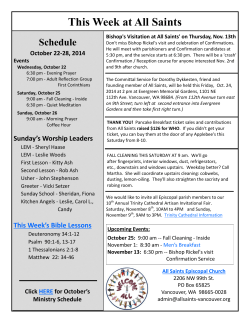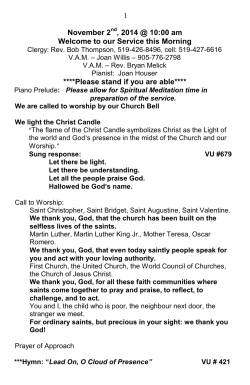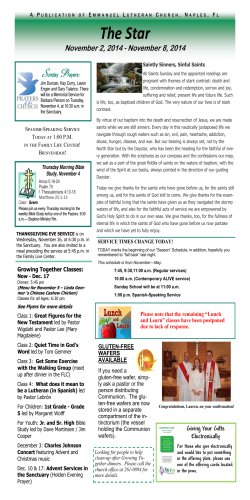
“The Communion of All Saints”-Psalm 149, Hebrews 11:39-12:2
“The Communion of All Saints”-Psalm 149, Hebrews 11:39-12:2 I had a grandmother who loved to use the word saint when referring to me and to other people. I can remember that often when she would make a request of me she would say, “Brad, would you be a saint and bring me that sweater?” She might say, ‘Would you be a saint and pick up those dishes and take them to the sink?” All of her requests gave me the opportunity to be called a saint. But is that all there is to being a saint? Is all we have to do to be a saint is to run helpful errands? Isn’t there some deeper commitment, some greater requirement of being a saint? This is All Saints Sunday. This is an opportunity to remember the saints of this church and the saints of our families who have gone on before us and to those who are alive and working today. These are people who made a difference in our lives and in our church. Many of those we celebrate today as saints were and are known to us in life as friends, spouses, siblings, parents, and children. All of us know people today that we live with, work with, and worship with who we would say that they are saints. All Saints Day is more than just remembering those who have gone on before us, it is also a day to remember that we fragile, frail, and oh-so- fallible men and women are recognized as saints. Every time the word saint is used in the New Testament, it refers to all members of the church. Not perfect people, not scholars, but everyday people just like you and me who worship God in a body known as the church. Most if not all of us can think of people in our present, our past, and people that we would define as saints. So how would we define a saint? I think the most obvious description of saints of today is that they are people who give, love, and sacrifice without ever wanting recognition or recompense. They give without expectations, love without reservation, and sacrifice with adoration. They are not people who are sinless. They are not perfect. Let me remind you of some saints in the Bible and in church history that were not. St. Peter denied Jesus three times. St. Paul persecuted Christians and cheered at Stephen’s stoning. St. David committed adultery and had the woman’s husband killed. St. Augustine was a spoiled, promiscuous, rebellious youth. St. Aquinas was gluttonous, rude, and abusive. But these along with many others that you can read about in Hebrews 11 were people that in spite of their sins were still faithful to God and his work. So they were saints. Saints are people both in the past and today who wear their hearts on their sleeves because they deeply love God and love working for him for others. Saints do weariness in well doing. Saints sometimes do wear crowns of suffering and long suffering. Saints wear crowns of martyrdom sometimes. Saints do mess up and bleed and fail. Saints do all of these things because they love. Today is the day the Church should celebrate all those saints that stand in our midst. “Saints” are those people who keep the heart of the Body of Christ warm, vital, and alive for the whole world to see. So what does all of this mean for us today on All Saints Sunday? In our lesson today in Hebrews the author gives some insight into this. He had just finished, in Hebrews 11, describing very vividly the lives and acts all of the saints in the Bible who had gone on before who had lived and died being faithful to God. Now in Hebrews 12 he pulls it all together for his readers and for us today. These verses have us picture a track meet with runners running a relay race with crowds of onlookers cheering the runners on. We see runners running and handing the baton off to the next runner who runs their leg of the race and then hands the baton to the next runner in the race. The author of Hebrews wants to remind us that we are called by God into a life of faith that resembles a relay race. Those who have gone before us in the faith and in the church have handed us the baton of work and faith and are expecting us to carry our leg of life and faith in Christ like they did. The most exciting thing is that these saints of the past are here to cheer us on. They want us to succeed. They want us to be faithful to God and now to Christ as they were, fixing our eyes on him as we run this race of faithful life. One day we will pass the baton onto future saints and we will watch them run the race of life serving God and we will cheer them on. Every living and deceased Christian is a saint. It is not based on our behavior but it is based on our calling by Christ and it is based on what we do with that calling. It is not always the big things we do that makes us saints. It is the small acts of love and kindness that we do also. His name was St. Ben and he was a member of my Deep Creek Church in Chesapeake. Ben was retired having owned a successful car dealership. Ben had been a widower for some time but he met a woman at the church and fell in love with her and fell in love with Jesus and with our church. After Ben married Janet he threw himself into the life of the church. Coming to our church Ben discovered Jesus for the first time and there was no stopping him then. He came to Bible studies, he agreed to be on the Finance committee, and he was a great help in odd jobs around the church. But what made Ben a wonderful saint is that he loved people. What I remember about Ben’s love is his lunch invitation. If you got invited out to lunch with Ben, he would take eight or so of us to the nearest Red Lobster restaurant. We would be given menus, but before we ate our lunch Ben insisted on eating desert first. He would order one of each dessert on the menu. When the eight or so different desserts came to the table he would pass them around and we would each get a bite of each dessert and pass it on until everyone had tasted every dessert and then we would order lunch. Ben told us that he did that because life was short and we might not get to dessert. Ben died several years after coming to the church. When he died he insisted that a fork be placed in his hand at his funeral. We honored that. The fork, he told me, was a reminder that after we eat a meal and the hostess says keep your fork, you know the best is yet to come. For him, the fork was to remind us that the best is yet to come. Ben was one of the saints of the church and he lived it out fully. On this All saints Day you are a saint, no matter what. God wants you to live into being one fully.
© Copyright 2026









